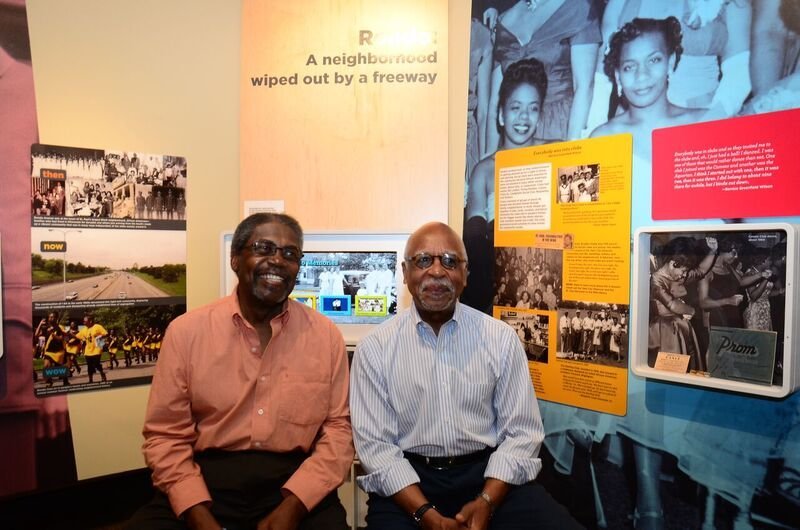A COHESIVE COMMUNITY
From its start in 1900 and for almost 70 years thereafter, the people of a small but cohesive community came together to form a unique and predominately African American neighborhood surrounding the main thoroughfare of Rondo Street (later know as Rondo Avenue). This neighborhood was known as Rondo.
Once settled in Rondo, these people worked hard and long at menial jobs, married, owned homes, raised families and sent their children to schools and colleges. They built churches, established businesses, formed social clubs and other institutions that led the fight against the persistent racism and oppression they often encountered on their jobs and throughout greater Saint Paul. Despite the social, political, and economic odds stacked against them, the community that became known as Rondo survived and thrived until it was destroyed by urban renewal and the construction of Interstate 94. For a more in-depth history of Rondo, please visit the Minnesota Digital Library.
Rondo Avenue Inc.
(1980s — PRESENT)Two decades after the destruction of the Rondo neighborhood, friends Floyd G. Smaller, Jr. and Marvin Roger Anderson formed Rondo Avenue Inc (RAI). Both Smaller Jr. and Anderson had grown up in Rondo. RAI’s mission was to preserve, conserve, and accurately interpret the contributions of Rondo’s thriving African-American community. In 1982, Smaller and Anderson launched the first annual Rondo Days Festival, celebrating the spirit of the neighborhood with a parade, music, dance, spoken word, storytelling, food, sports tournaments, a drill team competition, and vendors. In later years, RAI worked in partnership with researchers to collect oral histories, photographs, and maps, to ensure the memory of Rondo would live on.
RONDO DAYS FESTIVAL
For over 38 years, the Rondo Days Festival provided an event where past and present residents, African Americans, Whites, Hispanics, Protestants, Catholics, Muslims, and Jews could unite to resurrect and celebrate the memory of the old Rondo neighborhood that was home for many of them. After taking a hiatus during the Covid-19 pandemic, Rondo Days is back! Check out https://www.rondodays.net/about for updates on the latest celebration.
Rondo Commemorative PLaza (RCP)
Founded in 2016. In 2013, the two-story building at 820 Concordia Street went up in flames. Over the years, the building had served as a VFW post, a dance parlor, a coffee shop, and a restaurant. Most importantly, it had been a Rondo landmark, a reminder of the historically-black neighborhood that once thrived where I-94 now sits. A few days later, Marvin Anderson organized a wake for the building, and soon, he had a vision for the empty lot.
In 2016, Anderson, Smaller, and architects from 4RM+ULA and Ten x Ten, drew up the plans for a memorial plaza. Opened in July 2016, the Rondo Commemorative Plaza (RCP) is the first public memorial to the Black neighborhoods destroyed by interstate highways. Funds were provided from the City of St. Paul Community Development Block Grant, donations from a variety of local foundations, and the 3M African-American Employee Network.
The plaza is open to the public from sunrise to sunset and features brick pavers, built-in benches, and a 26-panel exhibit that tells the story of Rondo. A grassy mound is now home to several trees, and the sand is a favorite play spot for neighborhood kids. Eighteen chimes with attached hammers are located on the south side of the plaza, designed by artist Seitu Jones. Each chime is a dedication to the eighteen north-south streets that ran through Rondo, with written homages to notable families or residents of Rondo. A lighted tower stands at the northeast corner of the plaza, visible to anyone driving by on I-94.
Rondo Center of Diverse expressions (rcode)
Founded in 2018. In 2018, Marvin Anderson created the Rondo Center of Diverse Expressions (RCODE) at 315 N. Fisk Street. RCODE was formed to carry on the work initiated by Rondo Avenue Inc., and to provide administrative responsibility to the adjacent Rondo Commemorative Plaza. Our goals are threefold: 1) to celebrate history, cultural creativity, and the importance of the arts, 2) to inspire diverse people to find common ground in the Rondo corridor, and 3) to bring people together to build a trusting, robust, and engaging neighborhood.
Rondo Center Community Gardens (RCCG)
Rooted since 2020.In 2020, with funds from the Summit Avenue Residential Preservation Association, RCODE started the Rondo Center Community Gardens (RCCG). We are grateful to call upon 3M Volunteers and Rotary Club volunteers to garden throughout the spring, summer, and fall. Funds from the St. Paul Garden Club have been integral to the continued maintenance of the gardens. In 2023, thanks to a donation from White Bear Florals, we were able to plant over 700 native plant bulbs on the street-side medians along Fisk Street.
“I look at the tower on our plaza and see how it rises up—higher than the freeway. I hope it inspires people to see that, no matter what the obstacles, they can rise up and achieve what they want to do, too”
— Marvin Roger Anderson, co-founder of Rondo Avenue Inc. and Rondo Commemorative Plaza, founder of Rondo Center of Diverse Expressions.







